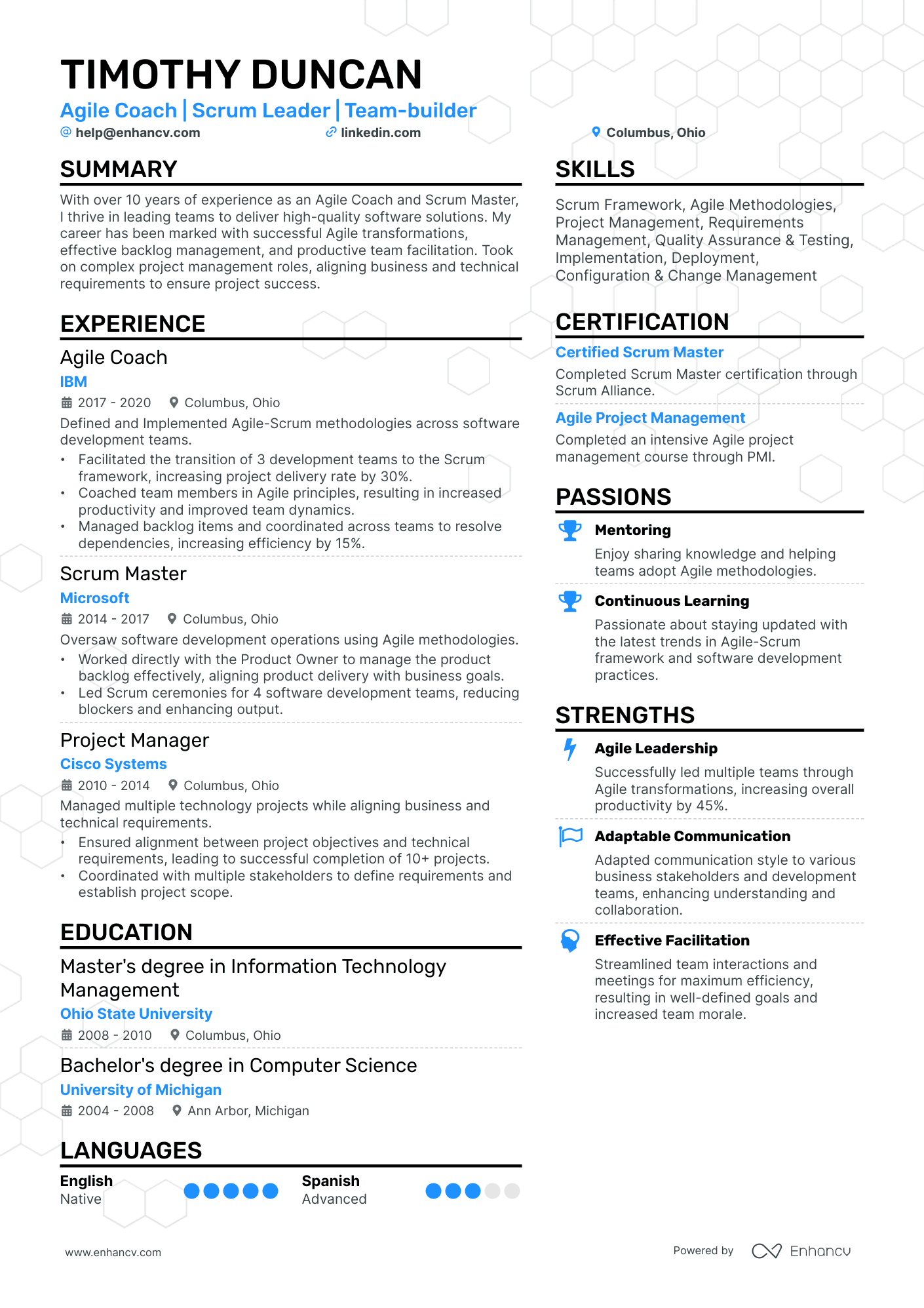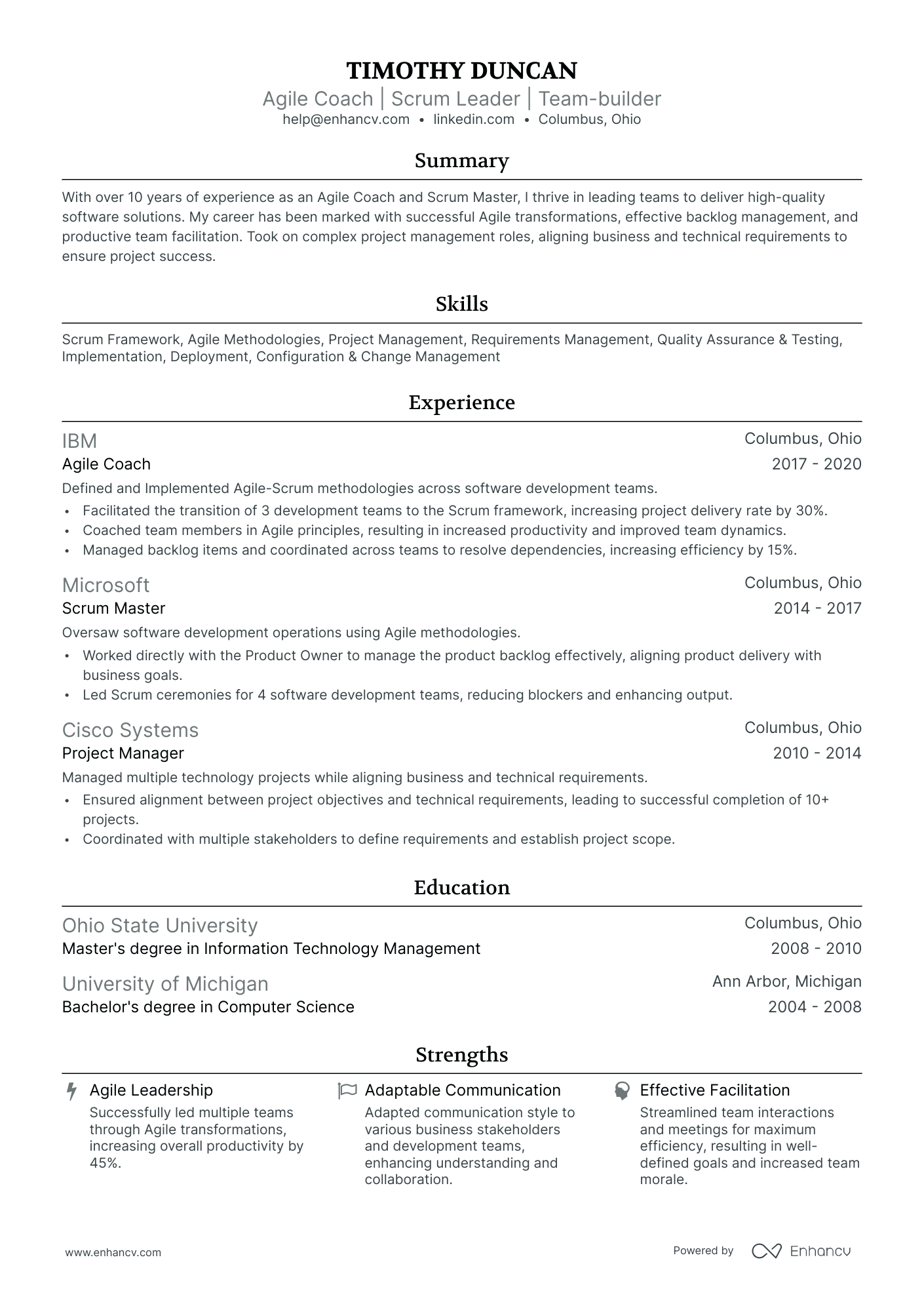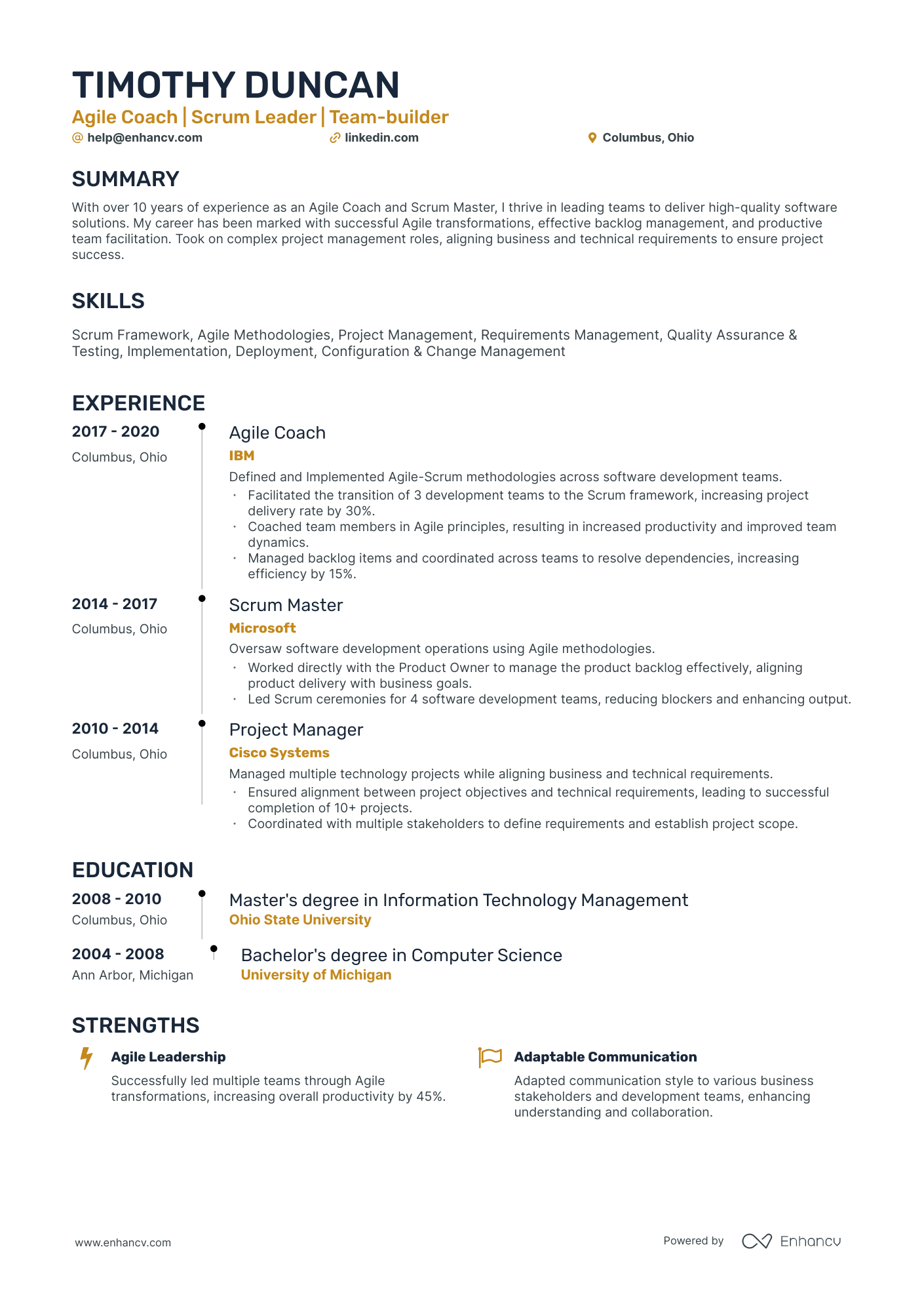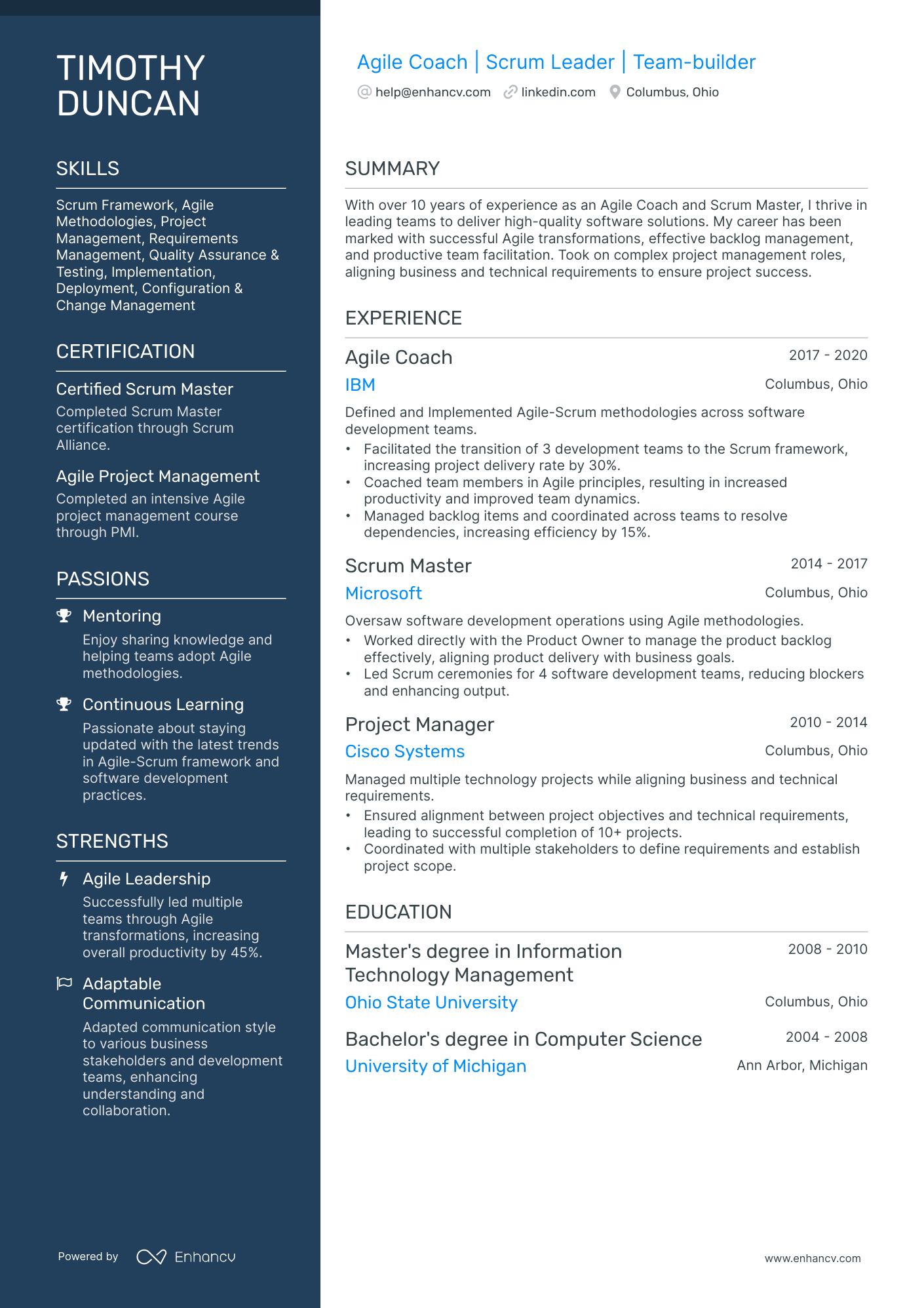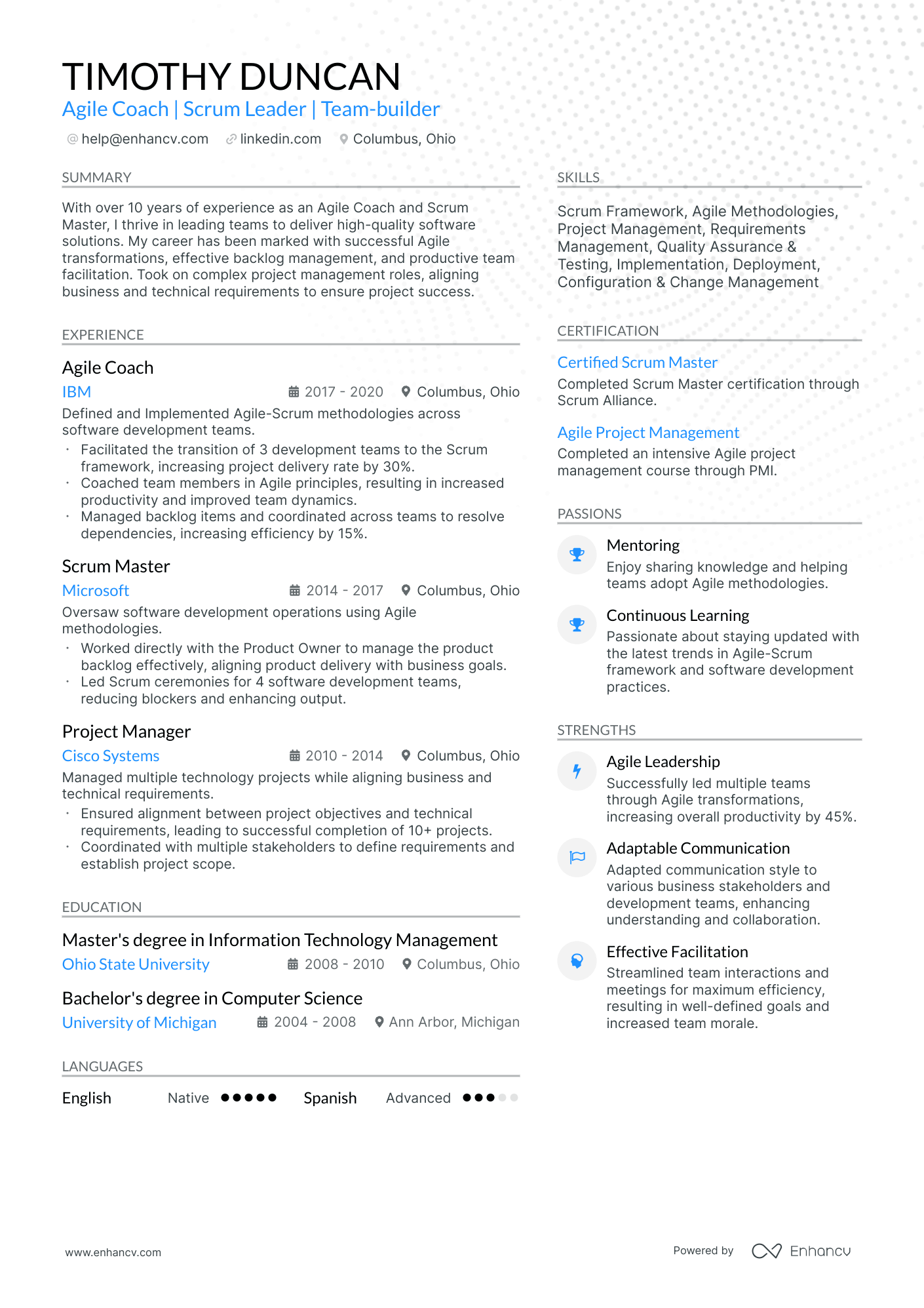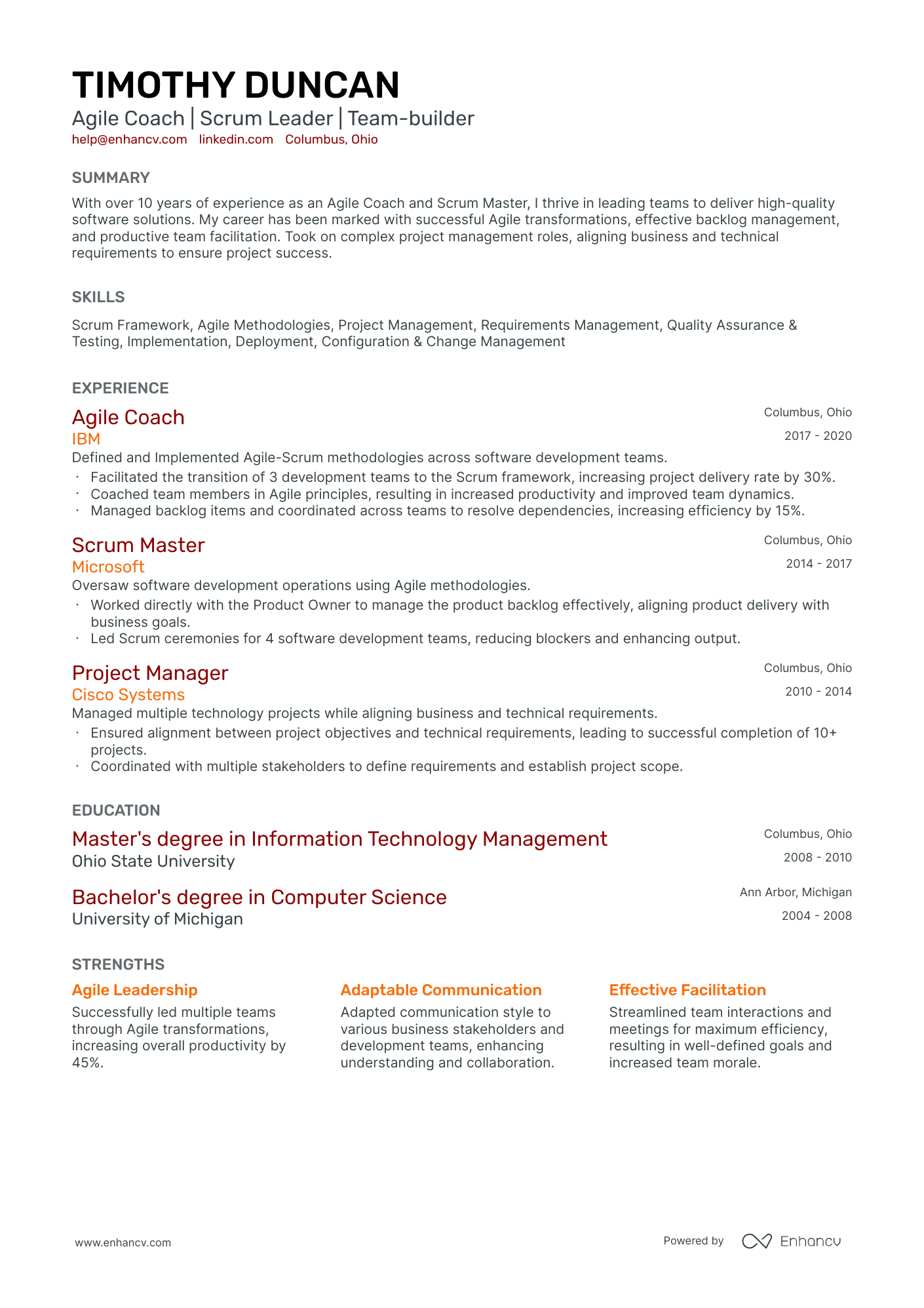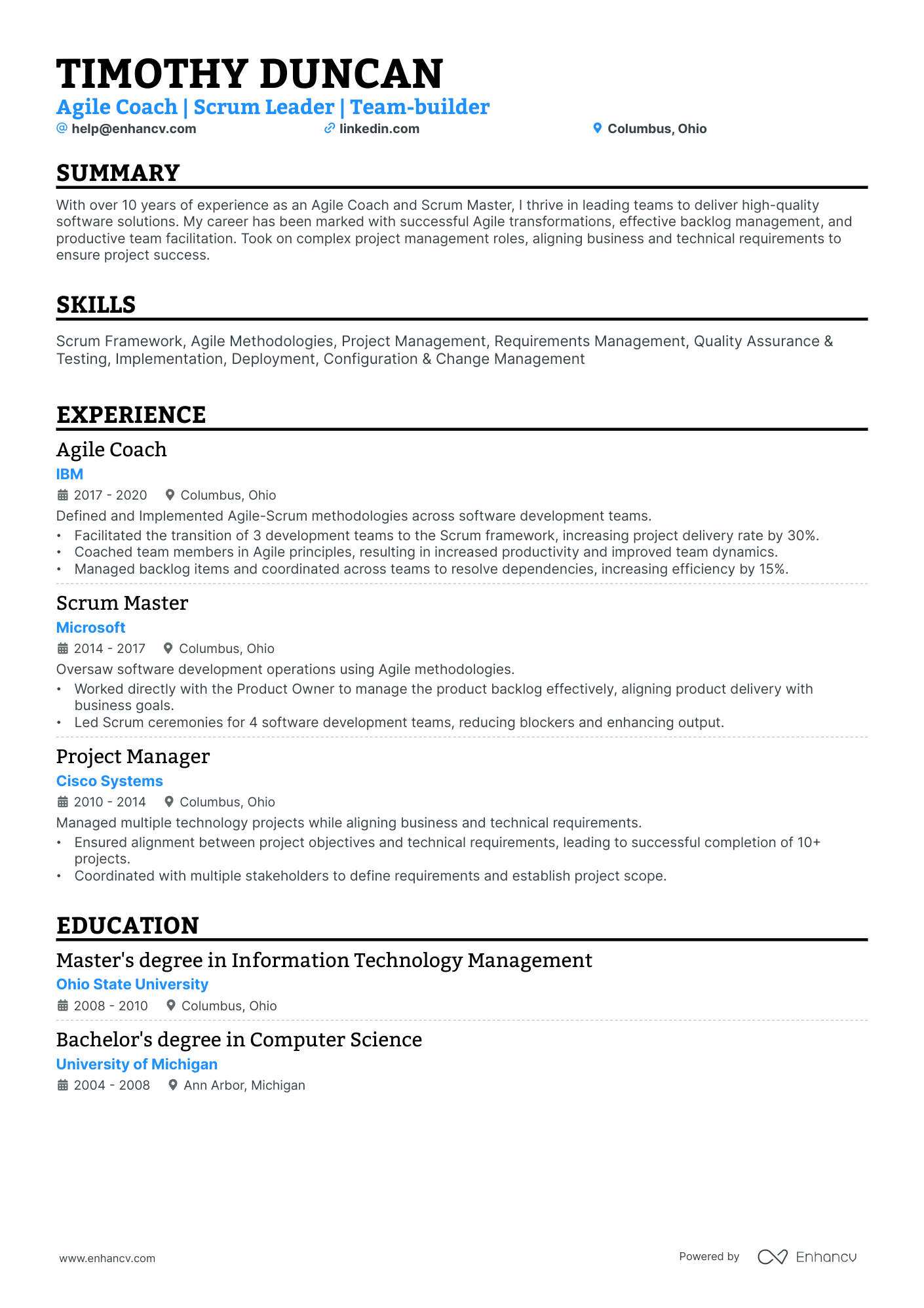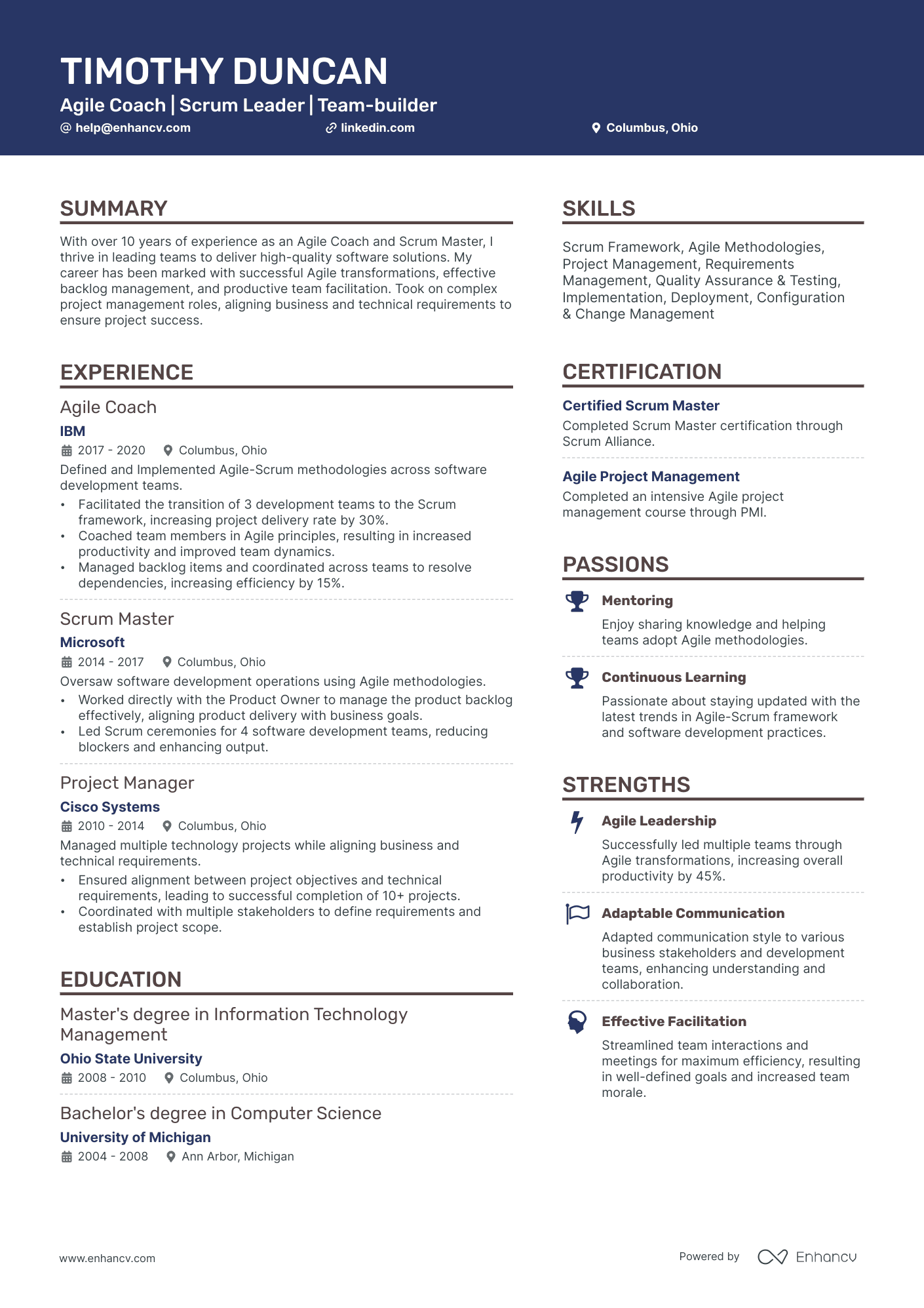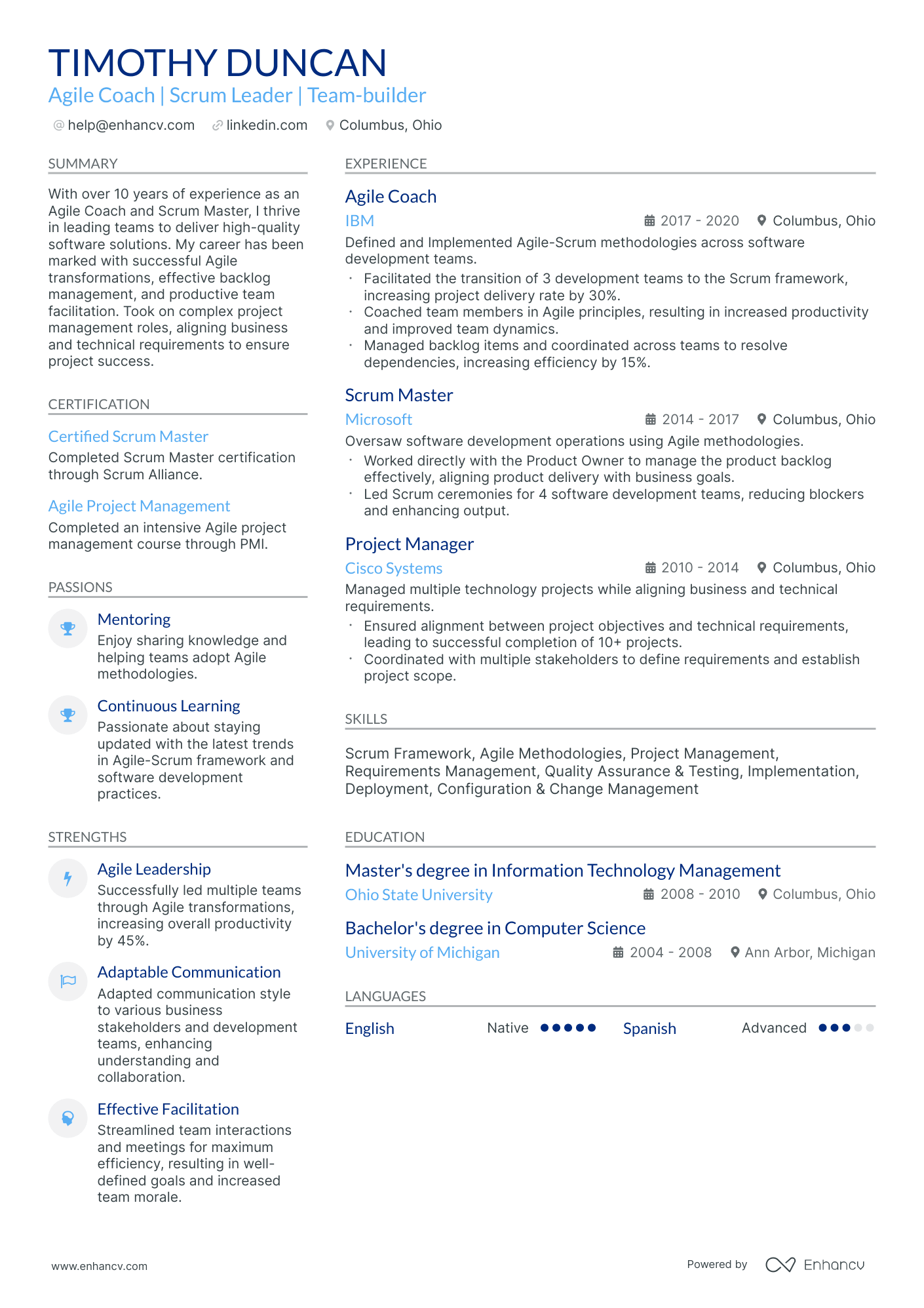One common resume challenge faced by agile coaches is effectively demonstrating their experience in leading diverse teams through complex projects while implementing Agile methodologies. Our guide offers step-by-step strategies to articulate these experiences concisely, using action verbs and quantifiable achievements, thereby ensuring your capabilities are clearly communicated to potential employers.
Dive into our concise guide to learn how to:
- Show your agile coach career's brightest moments through your resume's summary, objective, and experience sections.
- Explore top-notch agile coach resume examples to understand how to distinguish yourself from other candidates.
- Identify the most sought-after agile coach skills and certifications in the industry.
- Design a structured yet unique resume layout.
Recommended reads:
Deciphering the best format for your Agile coach resume
To craft an impactful agile coach resume, start by thoroughly analyzing the job description.
Your chosen resume format should seamlessly align your experience with the role's requirements.
Consider these four pivotal elements:
- Present your experience effectively. If you boast a wealth of pertinent experience, employ the reverse-chronological resume format, listing roles by date, beginning with the most recent.
- Maintain brevity. Limit your resume to a maximum of two pages, focusing on your most salient attributes.
- Headers serve a purpose. A well-crafted header ensures recruiters can swiftly access your contact details and professional portfolio.
- Opt for PDF. Typically, submit your agile coach resume in PDF to preserve its layout. However, always adhere to specific job application guidelines.
Different markets have specific resume formats – a Canadian resume could vary in layout.
Upload your resume
Drop your resume here or choose a file. PDF & DOCX only. Max 2MB file size.
Pro tip
If you don't happen to have that much relevant experience for the role, you could select a different format for your resume. Popular choices include:
- functional skill-based resume format - that puts the main focus on your skills and accomplishments;
- hybrid resume format - to get the best of both worlds with your agile coach experience and skills.
Essential sections for your agile coach resume, favored by recruiters:
- A clear header with pertinent links and contact information.
- A concise summary or objective, offering a snapshot of your career milestones and your fit for the agile coach role.
- An experience section detailing your professional qualifications and achievements.
- Skills sections that align your talents with job-specific keywords and requirements.
- Education and certifications sections that underscore your dedication to industry-specific growth.
What recruiters want to see on your resume:
- Experience in Agile Methodologies: Detailed understanding and implementation of various Agile methodologies such as Scrum, Kanban, Lean, XP etc.
- Coaching and Leadership Skills: Proven record of coaching teams towards successful transition to Agile practices. Leadership experience in guiding, mentoring and motivating agile teams.
- Problem Solving Skills: Ability to troubleshoot and solve complex problems, with examples of having navigated challenging organizational environments.
- Communication Skills: Excellent interpersonal skills, adept at facilitating discussions, conflict resolution, and nurturing cross-functional collaboration.
- Certifications: Relevant Agile certifications like Certified Scrum Master (CSM), SAFe Agilist, ICAgile Certified Professional (ICP) etc.
Recommended reads:
Detailing your relevant experience on your Agile coach resume
Showcase your credibility in the resume experience section. For an effective agile coach resume:
- Highlight measurable achievements.
- Scan the job advert for keywords and integrate them throughout your experience section.
- Emphasize your technical proficiencies and how you've applied them in various roles.
- Keep it simple: mention your responsibility, relevant skills, and the outcomes.
- Use this section to convey your unique value, soft skills, feedback received, and the type of company culture you thrive in.
Top professionals ensure their experience section offers a captivating look at their expertise. Check out our sample agile coach resumes for guidance.
- Led the Agile transformation for a large financial institution, implementing Scrum and Kanban methodologies resulting in a 30% increase in team productivity.
- Coached cross-functional teams on Agile principles and practices, facilitating daily stand-ups, sprint planning, and retrospectives to improve collaboration and delivery efficiency.
- Designed and delivered customized Agile training programs for both technical and non-technical stakeholders, increasing their understanding of Agile values and principles.
- Collaborated with product owners to define and prioritize product backlogs, ensuring alignment with business goals and customer needs.
- Mentored Scrum Masters and Product Owners, providing guidance on backlog refinement, user story creation, and effective Agile ceremonies.
- Developed and executed Agile adoption strategies for multiple software development teams in a technology consulting firm, resulting in a 25% reduction in time-to-market.
- Facilitated Agile workshops and coaching sessions, fostering a culture of continuous improvement and adaptive planning within teams.
- Implemented Lean Agile practices such as value stream mapping and visual management techniques, enhancing transparency and identifying bottlenecks.
- Collaborated with executive stakeholders to align Agile initiatives with overall organizational objectives, ensuring buy-in and support at all levels.
- Led the transition from Waterfall to Agile methodologies for a high-profile client, delivering a complex software project on time and within budget.
- Guided Agile teams in a fast-paced startup environment, facilitating sprint planning, backlog refinement, and daily stand-ups resulting in a 40% improvement in time-to-market.
- Implemented Agile metrics and tracking mechanisms to monitor team performance, enabling data-driven decision making and process improvements.
- Coached product owners on effective prioritization techniques, resulting in increased customer satisfaction and improved product delivery.
- Championed the adoption of Agile engineering practices, including test-driven development (TDD) and continuous integration (CI), leading to a 50% reduction in defects.
- Served as a change agent, promoting Agile values and principles across the organization and fostering a culture of collaboration and innovation.
- Coached multiple geographically distributed Agile teams in a multinational software development company, improving their delivery predictability by 20%.
- Facilitated Agile ceremonies such as sprint planning, daily stand-ups, and retrospectives, ensuring effective communication and problem resolution.
- Introduced Agile estimation techniques, including story points and planning poker, resulting in more accurate and reliable project forecasts.
- Collaborated with stakeholders to define project requirements, scope, and acceptance criteria, ensuring alignment between business objectives and development teams.
- Developed and delivered Agile training sessions for new hires, equipping them with the necessary knowledge and skills to work effectively in an Agile environment.
- Led the Agile transformation for a large retail company, implementing Scrum practices resulting in a 35% improvement in time-to-market for new product releases.
- Coached and mentored Agile teams on effective backlog management techniques, ensuring clear prioritization and optimal resource allocation.
- Implemented visual management tools such as Kanban boards and burndown charts to improve transparency and track progress towards sprint goals.
- Facilitated workshops and retrospectives to identify process bottlenecks and implement continuous improvement initiatives, resulting in a 20% reduction in defects.
- Collaborated with business stakeholders to define and refine product roadmaps, aligning them with market trends and customer demands.
- Guided cross-functional Agile teams in an e-commerce company, facilitating Agile ceremonies and promoting collaborative decision-making resulting in a 45% increase in customer satisfaction.
- Coached product owners on effective backlog refinement and user story definition techniques, enabling faster product delivery and reducing time-to-market by 30%.
- Implemented Agile scaling frameworks such as SAFe (Scaled Agile Framework) to coordinate multiple teams and synchronize their efforts, ensuring efficient release planning and execution.
- Established Agile metrics and dashboards to monitor team performance, providing actionable insights for continuous improvement and course correction.
- Led Agile training programs for new hires and existing team members, fostering a shared understanding of Agile principles and practices across the organization.
- Coached software development teams on Agile methodologies, leveraging Scrum and Kanban practices resulting in a 30% improvement in productivity and delivery predictability.
- Facilitated cross-functional collaboration and effective communication by conducting regular stand-ups, sprint planning, and retrospective meetings.
- Introduced Agile engineering practices such as pair programming and test automation, resulting in a 40% reduction in defects and improved code quality.
- Collaborated with stakeholders to define project goals and success criteria, ensuring alignment between business objectives and development efforts.
- Provided guidance and mentoring to Scrum Masters and Product Owners, helping them address challenges and improve their Agile leadership skills.
- Led the Agile transformation for an educational technology company, implementing Agile frameworks resulting in a 25% increase in product release frequency.
- Coached development teams on Agile principles and practices, facilitating sprint planning, daily stand-ups, and retrospective meetings to enhance collaboration and accountability.
- Implemented DevOps practices, enabling continuous integration and deployment resulting in a 50% reduction in time-to-market for feature enhancements.
- Collaborated with stakeholders to prioritize and refine product backlogs, ensuring that the most valuable features were delivered to customers timely.
- Developed and delivered Agile training programs for both technical and non-technical teams, fostering a culture of agility and innovation.
- Coached Agile teams in a telecommunications company, guiding them in adopting Scrum practices resulting in a 30% improvement in time-to-market for new services.
- Facilitated Agile ceremonies and promoted effective collaboration among team members, leading to a 25% reduction in development cycle time.
- Implemented Agile project management tools and techniques, enhancing transparency and enabling better tracking of project progress and risks.
- Mentored product owners on backlog management and prioritization techniques, ensuring that customer value was maximized in each release.
- Led the implementation of Agile metrics and reporting mechanisms to measure team performance, enabling data-driven decision-making and continuous improvement.
- Driving Agile transformation in a healthcare technology company, implementing Agile methodologies resulting in a 20% improvement in delivery predictability.
- Coaching Agile teams on Scrum and Kanban practices, conducting regular ceremonies and fostering a culture of collaboration and accountability.
- Introduced Agile project management tools such as Jira and Trello, enabling better visibility and tracking of work items and dependencies.
- Collaborating with business stakeholders to align project goals with strategic objectives and ensure continuous alignment throughout the development lifecycle.
- Mentoring Scrum Masters and Product Owners, providing guidance on effective Agile leadership and facilitating their professional growth.
Quantifying impact on your resume
<ul>
Building a agile coach resume when experience is sparse
If you're light on relevant experience, consider highlighting:
- Short-term roles or internships undertaken during your academic years.
- Contractual roles, emphasizing their relevance and the outcomes achieved.
- Alternative resume formats, such as functional or hybrid, that spotlight your skills.
- Research roles, especially if they involved significant projects or if your contribution was pivotal to the project's success.
Recommended reads:
Pro tip
The experience section is all about relevancy to the agile coach role. Decide on items that will show your expertise and skills in the best possible light.
How to create an impactful Agile coach resume skills section
Recruiters always care about the skill set you'd bring about to the agile coach role. That's why it's a good idea to cherry pick yours wisely, integrating both hard (or technical) and soft skills.
Hard skills are gained through studying, are certifiable, and it's impossible to do your job without them. All in all, they show your suitability for the technical aspect of the role.
Your soft skills are those personality traits you've gained over time and most often than not - outside of the workplace. Soft skills are more difficult to quantify but are definitely worth it - as they show how you'll fit and adapt into a new team environment.
How do you build the skills section of your resume?
- Include up to five or six skills in the section as keywords to align with the advert.
- Create a specific technical skills section to highlight your hard skills aptitude.
- Read more about the culture of the company you're applying and cherry pick the soft skills you have that deserve a mention.
- Make sure you answer the majority of the job requirements that are in the advert within your skills section.
A agile coach's resume requires a specific skill set that balances both industry-specific hard skills with personal, soft skills. Discover the most often used ones on agile coach resumes from our list:
Top skills for your agile coach resume:
Scrum
Kanban
JIRA
Agile methodologies
SAFe (Scaled Agile Framework)
Lean principles
DevOps practices
Continuous Integration/Continuous Deployment (CI/CD)
User Story Mapping
Facilitation tools (e.g., Miro, MURAL)
Communication
Leadership
Coaching
Conflict resolution
Empathy
Adaptability
Problem-solving
Team building
Mentoring
Influencing
Pro tip
When detailing your skills, always back them up with tangible evidence, be it quantifiable results or certifications.
The importance of your certifications and education on your Agile coach resume
Pay attention to the resume education section . It can offer clues about your skills and experiences that align with the job.
- List only tertiary education details, including the institution and dates.
- Mention your expected graduation date if you're currently studying.
- Exclude degrees unrelated to the job or field.
- Describe your education if it allows you to highlight your achievements further.
Your professional qualifications: certificates and education play a crucial role in your agile coach application.
They showcase your dedication to gaining the best expertise and know-how in the field.
Include any diplomas and certificates that are:
- Listed within the job requirements or could make your application stand out
- Niche to your industry and require plenty of effort to obtain
- Helping you prepare for professional growth with forward-facing know-how
- Relevant to the agile coach job - make sure to include the name of the certificate, institution you've obtained it at, and dates
Both your certificates and education section need to add further value to your application.
That's why we've dedicated this next list just for you - check out some of the most popular agile coach certificates to include on your resume:
Best certifications to list on your resume
Pro tip
If you have basic certificates, place them in the skills or experience section. This saves space for high-demand industry certificates.
Recommended reads:
Summary or objective: maximizing the impact of the top third of your resume
The top third of your agile coach resume is crucial. It's often the first thing recruiters see and can set the tone for the rest of your application.
Whether you choose a resume summary or a resume objective, make it count. The former is great for showcasing career highlights, while the latter balances your achievements with your future aspirations.
Both should be tailored to the role, as there's no universal approach to crafting the perfect agile coach summary or objective. Use the examples below as a starting point.
Resume summary and objective examples for a agile coach resume
- Dynamic agile coach with over 10 years of experience in IT. Specializes in Scrum, Kanban, and Lean methodologies to enhance software development processes. Notable achievement includes leading a team to deliver a mission-critical project 20% ahead of schedule while maintaining high-quality standards.
- Devoted agile coach boasting 8 years of expertise in the financial sector. Proficiency in agile principles, scrum development, and change management. Recognized for successfully steering a cross-functional unit through a complete Agile transformation, reducing product delivery time by 30%.
- Seasoned Project Manager transitioning into agile coaching with a comprehensive knowledge base of Waterfall and Agile frameworks. Brings forth an impressive track record of coordinating large-scale projects, keen strategic vision, and a commitment to fostering team growth. Skilled in risk mitigation and conflict resolution.
- Experienced Business Analyst eager to leverage practical knowledge of data-driven decision-making processes in an agile coach capacity. Offers a solid understanding of Agile and Scrum methodologies stemming from hands-on project involvement. Demonstrated ability to facilitate communication between diverse teams.
- Entry-level professional aspiring to apply strong foundation in project management and organizational skills to contribute as an agile coach. Adept at translating complex technical concepts into layman's terms, coupled with an unwavering commitment to continuous learning and skill development in Agile methodologies.
- Recent Computer Science graduate committed to launching career as an agile coach. Strengths include a robust theoretical grasp of Scrum and Kanban methodologies, exceptional problem-solving skills, and a passion for helping teams achieve their maximum potential via efficient practices.
Enhancing your Agile coach resume with additional sections
Make your agile coach resume truly distinctive by adding supplementary sections that showcase:
- Awards that underscore your industry recognition.
- Projects that bolster your application's relevance.
- Hobbies, if they can further your candidacy by revealing facets of your personality.
- Community involvement to highlight causes you champion.
Key takeaways
- Effective agile coach resumes are well-structured, weaving a compelling career narrative.
- Choose between a resume summary or objective based on your experience and the impression you aim to create.
- If lacking in direct experience, leverage other roles, such as internships or contract positions, to demonstrate alignment with the agile coach role.
- Be discerning in listing hard and soft skills, ensuring relevance and showcasing outcomes.
- Always tailor your resume for each agile coach application, ensuring alignment with job requirements.
